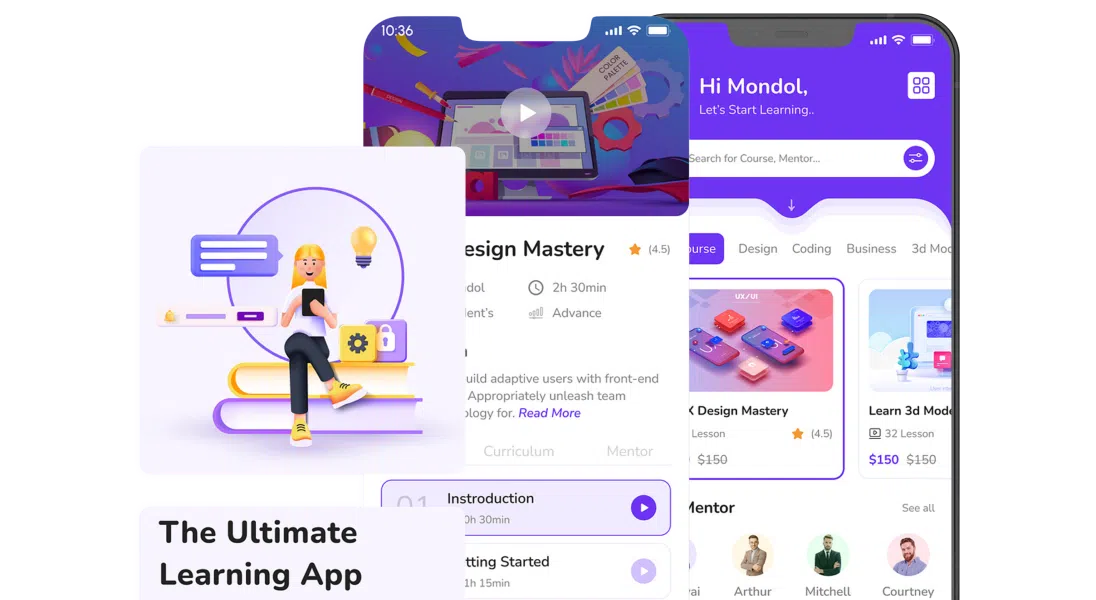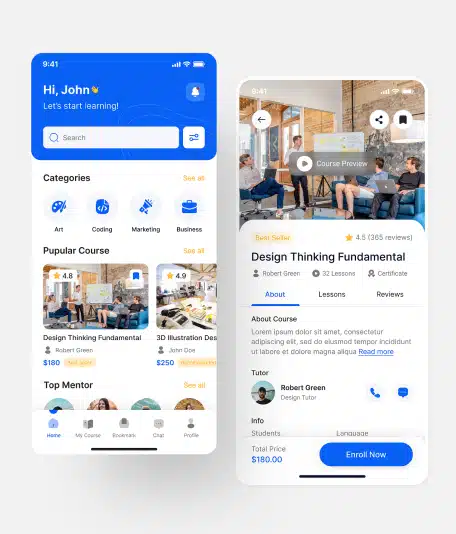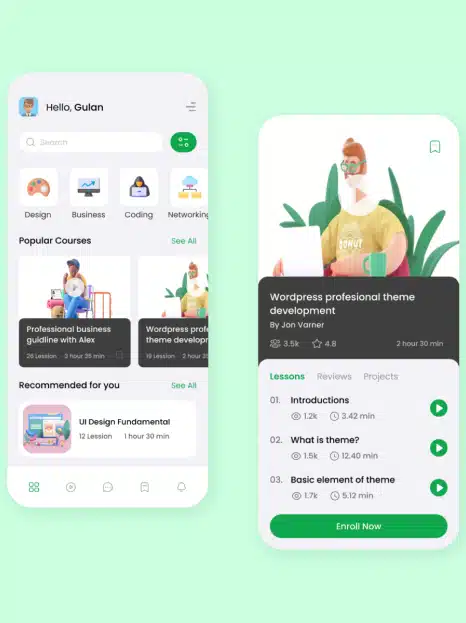An industry-leading education app development company committed to addressing the pressing pain points in learning experiences. Whether it’s enhancing accessibility, personalization, or engagement, we focus on crafting solutions that alleviate the challenges learners face, ensuring a seamless and impactful educational journey for all.
Education App Development Company

Our Portfolio of Educational App
Development Services
With a learner-focused approach, our educational app developer build a cohesive set of eLearning elements, tools, and resources supporting knowledge delivery and management.
Crafting interactive and engaging online training solutions, our E-Learning Educational App Development services empowers seamless knowledge delivery, fostering engaging and effective learning experiences.
- Business Training App
- Onboarding and Training App
- Staff Engagement App
- Skill Developing App

LMS Development
Revolutionizing the way organizations train and educate, our custom LMS platforms offer scalable, user-friendly solutions that streamline content delivery, tracking, and assessment, fostering a culture of continuous learning and development.
- Corporate LMS Solution
- Learning Gamification
- Multi-platform Adaptability
- Certification Provision
language learning app development
Pioneering linguistic proficiency, our Language Learning Applications blend immersive technologies and adaptive learning paths to unlock new linguistic horizons, making language mastery more intuitive, engaging, and culturally rich.
- AI-Powered Chatbot
- Vocabulary Builder
- Adaptive Learning Algorithms
- Speech Recognition
E-Learning App Development
At the forefront of digital education, our E-Learning App Development creates immersive and personalized learning environments, leveraging multimedia content and interactive technologies to make education accessible and engaging for all ages.
- Corporate Learning Solutions
- On-demand E-learning App
- Employee Engagement Solutions
- Virtual Learning Environments

With the continous improvement, Platform-Specific App Development ensures optimized and responsive applications, tailored to various platforms, enhancing accessibility and performance.
- Cross-Platform Education App
- Web Education App
- iOS Education App
- Android Education App
Transform the conventional education system, tailoring a contemporary learning experience accessible to all users.
Discover, Develop, Deploy
As the top build tech team in Vietnam, we focus on adding extra value to your business by applying only the latest technologies, which results in higher profitability & company evaluation.
Collaboration and
Communication
- Interactive virtual whiteboard
- Adoptive video and audio conferencing
- Sessions recording and sharing
- Polls and surveysText, audio, live video chat
- Real-time learning
- In-app push notifications and email alerts
- Discussion boards and forums
Analytics and
Reporting
- Reports and analytics
- Data analytics
- Progress tracking dashboard
- Performance tracker
- Real-time progress tracking and analytics
User Management and
Engagement
- Sign up and Log in
- User profiles
- Admin panel
- Integrating leaderboards
- Multi-lingual support
- AI personalization
- Gamification
- In-app purchases
Content and Classroom
Management
- Lecture scheduling
- Document management and download
- Video conferencing
- Classroom-forum
- LMS integrations
- Various third-party integrations
- Online and offline mode
- Enabling voice recognition and command
Technologies Powering E-Learning App Development
We blend market know-how with the latest tech to offer you tailored solutions that balance cost and quality.
Artificial Intelligence
Transform learning with AI-driven features, from progress tracking to voice recognition, in our educational mobile app development services.
Big Data
Unlock insights through our educational app’s Big Data analytics, offering daily reports and performance tracking for informed learning experiences.
Blockchain
Ensure secure eLearning experiences with Blockchain integration in our app development, combating data threats and enhancing cybersecurity.
AR/VR
Embrace immersive learning through SCORM, AICC, and xAPI supported virtual solutions in our educational app development services.
Gamification
Engage learners globally with our game-based educational app development, fostering interactive and captivating learning environments.
Features for Education App Development
Stay ahead with the latest features designed to enhance your learning and development experience all within a user-friendly interface
Education Market Insight Driven
Backed by extensive experience and expertise, our approach is propelled by thorough education market analysis. We leverage comprehensive research to tailor solutions that precisely align with evolving edtech trends, ensuring our apps resonate with the current educational landscape.
User-Centric Design and Experience
Central to our ethos is the learner’s journey. Our designs prioritize user experience, ensuring intuitive interfaces, accessibility features, and engaging interactions, enhancing student and educator engagement while simplifying complex learning tasks.
Adaptability to Latest Teaching Methodology
Our apps seamlessly integrate the latest teaching methodologies, such as flipped classrooms, project-based learning, and personalized instruction. We empower educators with tools that effortlessly accommodate innovative teaching approaches, facilitating enhanced and effective learning experiences.
Increased Cost Effectiveness
We focus on cost efficiency while maintaining exceptional quality. Our team expertly navigates suitable tech stacks and collaboration models, striking a balance between your budget and requirements.
Partner with Savvycom to develop lucrative education app.
What Business Leaders Say About Savvycom
We deeply appreciate all feedbacks to improve the quality of our services!



